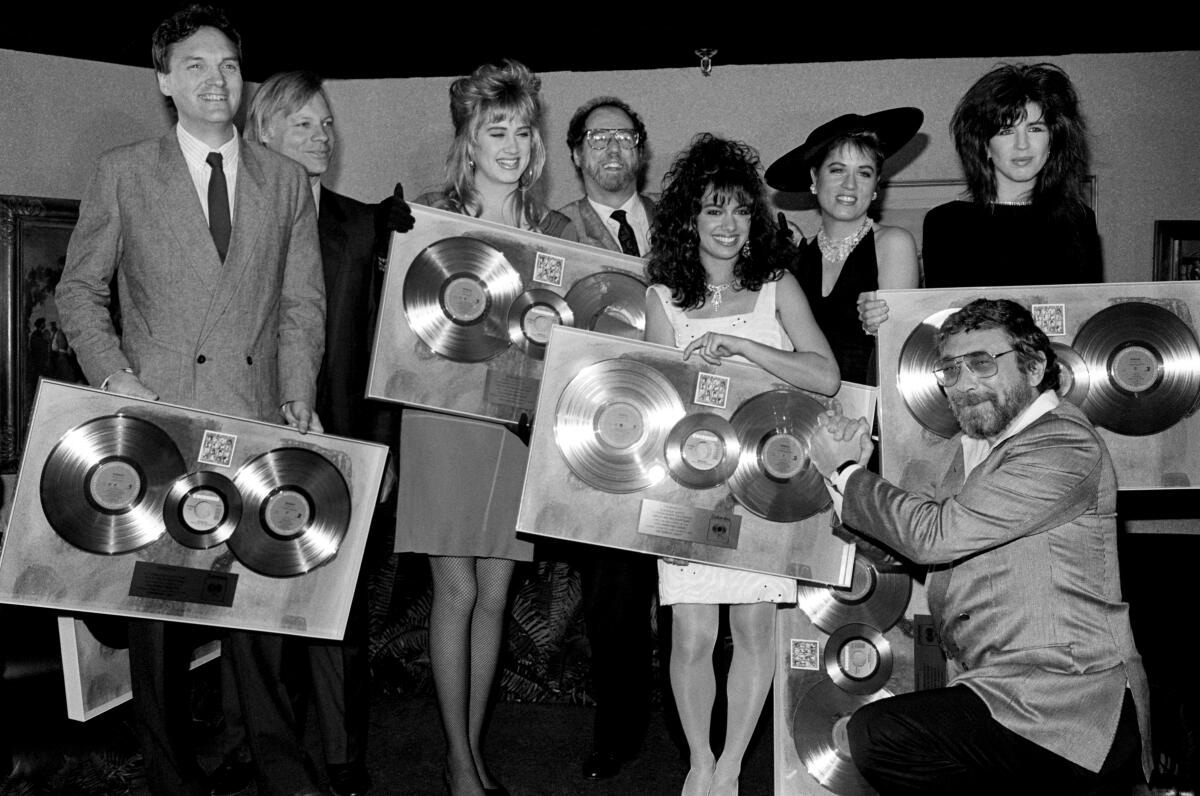Walter Yetnikoff, combative and beloved record-industry titan, dies at 87
- Share via
Walter Yetnikoff, the combative, profane, licentious record company executive whose frequent feuds, unrestrained drug and alcohol consumption, and skillful management of superstar egos made him a powerful, feared but also beloved music man, died Sunday at age 87.
His wife, Lynda, said he died of cancer at a hospital in Bridgeport, Conn.
Yetnikoff was president/chief executive of CBS Records, which vied with Warner Bros. as the industry’s dominant label, from 1975 to 1990. The CBS artists he worked with included Michael Jackson, Bob Dylan, Bruce Springsteen, Barbra Streisand, Billy Joel, the Rolling Stones, Paul Simon, Cyndi Lauper, Elvis Costello, the Clash, Paul McCartney, Public Enemy, Julio Iglesias and Quiet Riot. Under his leadership, the New York-based label’s annual revenue grew from $485 million to more than $2 billion. He was richly compensated, including a reported $20-million bonus after he oversaw the sale of CBS Records to Sony for $2 billion in 1987. Soon after, Rolling Stone called him “the most powerful man in the record business.”
“Walter stuck by my side no matter what project I presented him with — ‘Nebraska,’ ‘Born in the U.S.A.,’ he was always there for me. Always,” Springsteen attested via email. “A wild man in the old school music business tradition, yup. But when the chips were down and the records were getting made and you were getting paid, he was there 100%. I loved Walter because he respected and shepherded my art through an often hostile and unfriendly music business. I considered him my friend.”
“Walter was a street fighter,” Joel told The Times by email, “a man who didn’t shy away from confrontation with other power players when it came to protecting his artist’s interests. I loved him as a dear friend and a mentor, in a business where real friendships don’t exist.”

Yetnikoff reigned in an era before synergy- and accounting-driven business decisions, when personal relationships mattered and success justified unsavory means. For instance, he had no qualms about hiring independent promoters, who were accused of using payola and other illegal means to help create a hit record. “They get results,” he shrugged in 1986. In Yetnikoff’s day, a buccaneer didn’t have to explain himself to anyone.
“Walter was — how do I say this politely? — he was very meshuggah. Let’s say extraordinarily eccentric,” lawyer Alan Grubman said in an interview for the 2011 book “I Want My MTV” (co-authored by this writer and Times music editor Craig Marks). Yetnikoff freely acknowledged his excesses and outbursts. His life, he explained in “Howling at the Moon: Confessions of a Music Mogul in an Age of Excess,” a 2004 memoir written with David Ritz, consisted of three acts: “Act 1, I start to get crazy. Act 2, I get crazier. Act 3, craziest of all.”
Joseph Arthur has spent the past year opposing the COVID-19 vaccine on social media. His manager and band quit, and his remaining fans beseech him to stop.
Walter Roy Yetnikoff was born Aug. 11, 1933. He grew up in Brownsville, Brooklyn, in the era of pushcarts, street gangs and Leo Durocher. His father, Max, worked for the city, painting hospitals; his mother, Bella, was a bookkeeper. They shared a house with relatives and were a loud, quarrelsome family. Yetnikoff later said his father often hit and kicked him.
Walter attended Brooklyn Tech High School and then Brooklyn College, which he graduated in three years, then gained admission to Columbia Law School. Of the available career choices for smart, ambitious Jewish boys, “law seemed least taxing,” he later said. In 1957, he married June May Horowitz, and they soon had a son, Michael. A second son, Daniel, followed in 1962.
After law school, he was hired as a junior litigator at the august firm of Rosenman and Colin. He befriended a co-worker named Clive Davis, a Brooklyn Jew who’d lost his New York accent at Harvard, and after Davis took a job at CBS Records in the legal department, he persuaded Yetnikoff to join the company too, offering him a raise from $8,000 to $10,000. The biggest artists at CBS were Johnny Mathis and Andy Williams, but the company had also signed an odd folk singer named Bob Dylan, whose music would point the label toward a future guided by younger executives.
“As the Sixties came to an end,” Yetnikoff wrote in “Howling at the Moon,” “the paradigm of power was turned on its head. The artist no longer had to go to the label, hat in hand.” His schmoozing skills served him well, as did his observational prowess, and soon he was traveling the world and indulging in intoxicants and affairs.
Davis, who didn’t see why he should restrict himself to legal briefs, began signing a cavalcade of new-generation artists: Janis Joplin, Santana, Chicago, Simon & Garfunkel. He was promoted to president of Columbia Records, a CBS subsidiary, but in 1973 the company fired him for playing fast and loose with his expense accounts. (Davis denied any improprieties.) Yetnikoff kept rising in the company, and after the retirement of CBS Records President Goddard Lieberson, an elegant Brit who studied classical piano, he ascended to president of CBS Records. He celebrated by visiting his mistress, a married music-biz executive.
In “Howling at the Moon,” Yetnikoff gleefully recounts the decade and a half that followed, which began when he signed the Jacksons, bringing him into a fruitful relationship with Michael Jackson. His success and his indulgences, he came to understand, would feed off one another: “The more [money I made for CBS], the crazier I could afford to be.”
Springsteen’s third album, “Born to Run,” gave CBS a big hit in 1975, and Earth, Wind & Fire had its biggest album, the triple platinum “That’s the Way of the World.” Boston’s debut followed, eventually selling 11 million copies, and then came Meat Loaf’s “Bat Out of Hell,” which tallied 14 million, and Billy Joel’s “The Stranger,” which turned the cult artist into a superstar, selling 10 million units.
Yetnikoff was feeling his oats. He successfully poached James Taylor from Warner Bros., CBS’ Left Coast top-dog competitor, and when Warners replied by making an offer to Paul Simon, Yetnikoff said to the diminutive singer, “For a tiny little squirt, you’ve got a big mouth.” (Simon left and got minor revenge in the movie “One Trick Pony” by basing an evil record executive on Yetnikoff.) Yetnikoff played the good cop as well as the bad cop, creating what he called “a mutual balance of terror between me and my artists.”
Record sales began to nosedive in 1979, but CBS released Jackson’s “Thriller” in late 1982. It outsold every other record that had ever been released and solved CBS’ financial woes for a while, while also triggering the most contentious event of Yetnikoff’s career.
As he told the story, MTV refused to play the “Billie Jean” video because it didn’t fit the rock ‘n’ roll music format. Yetnikoff said he accused MTV of racism and threatened to pull every CBS video from the network if it didn’t support Jackson; MTV executives dismissed this as a self-serving lie. “That’s a typical Walter trick — make himself look important to his artists,” former MTV boss Bob Pittman scoffed in “I Want My MTV.” By the time the network played the “Billie Jean” video, the song was at No. 1 and it goosed MTV’s ratings so much that it was soon adding the 13-minute-long “Thriller” video, and playing it every hour.

In 1989, a doctor warned Yetnikoff he’d be dead in three months, and the executive went into rehab for alcoholism and drug addictions. But sobriety didn’t lessen his ego, and after CBS artists began complaining about him, his new Japanese bosses replaced him with his protégé, Tommy Mottola.
Yetnikoff later formed his own label, VelVel Records (“Velvel” was his Yiddish name), where he worked with the Kinks and Pulp. And he published his frank memoir, in which he both boasted and repented for his behavior. “I destroyed my family,” he wrote. “I made the choice and now live with the remorse.”
His first marriage ended in divorce, as did his second, to Cynthia Slamar. He is survived by Lynda Kady Yetnikoff, whom he married in 2007, his sons Michael and Daniel, a sister, Carol Goldstein, and four grandchildren.
Yetnikoff’s rock-star chutzpah earned him plenty of enmity but even more loyalty from artists he helped succeed. At the Grammy Awards in 1984, Jackson, in the midst of winning an unprecedented eight awards for “Thriller,” took the unusual step of calling Yetnikoff to the podium, describing him as “the best record company president in the world.”
“I went back to CBS, and I said, ‘Give me another $2 million for that,’” Yetnikoff said. It’s hard to know if he was joking.
More to Read
The biggest entertainment stories
Get our big stories about Hollywood, film, television, music, arts, culture and more right in your inbox as soon as they publish.
You may occasionally receive promotional content from the Los Angeles Times.









